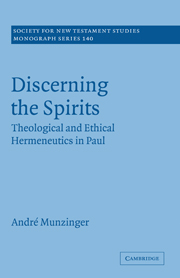Book contents
- Frontmatter
- Contents
- Preface
- Abbreviations
- Part I Introduction
- Part II What Requires Discernment? The Objects of Evaluation
- Part III How Can and Should True Discernment Take Place?
- 5 The Context and Background of Paul
- 6 How Does Paul Believe True Discernment Can and Should Take Place?
- Part IV Conclusion
- Bibliography
- Author Index
- Passage Index
- Subject Index
5 - The Context and Background of Paul
Published online by Cambridge University Press: 26 October 2009
- Frontmatter
- Contents
- Preface
- Abbreviations
- Part I Introduction
- Part II What Requires Discernment? The Objects of Evaluation
- Part III How Can and Should True Discernment Take Place?
- 5 The Context and Background of Paul
- 6 How Does Paul Believe True Discernment Can and Should Take Place?
- Part IV Conclusion
- Bibliography
- Author Index
- Passage Index
- Subject Index
Summary
Introduction
Having gained some understanding of the significance of the role of discernment within Paul's own thought and the importance he attaches to it for the community and the individual believer, we are naturally interested in how this discernment is to take place. How does Paul think that believers can discern the things that matter and are pleasing to God? I have already mentioned that the key appears to lie in the interaction of Spirit and mind. While we must still probe Paul himself as to what he could have meant by this interaction, he does not offer us an epistemological or psychological system by which we can easily go about that task. For this purpose we must investigate the context within which Paul lived and thought. Not only can the scholars and thinkers of Paul's own time illuminate our understanding of his (and his readers') conceptual framework, but also, as we shall see, in a number of cases there are strikingly similar strands of thought.
I will proceed by looking at forms of Judaism first, continuing with Philo of Alexandria, who offers a mixture of Jewish and Hellenistic thought, and finally considering the Stoics. The order is methodologically significant as I acknowledge that Paul's primary ‘background’ allegiance was to Judaism and only the answers which cannot be found there should be sought elsewhere. However, at the end of the chapter I attempt to offer further justification for the breadth of traditions offered here.
- Type
- Chapter
- Information
- Discerning the SpiritsTheological and Ethical Hermeneutics in Paul, pp. 101 - 140Publisher: Cambridge University PressPrint publication year: 2007



